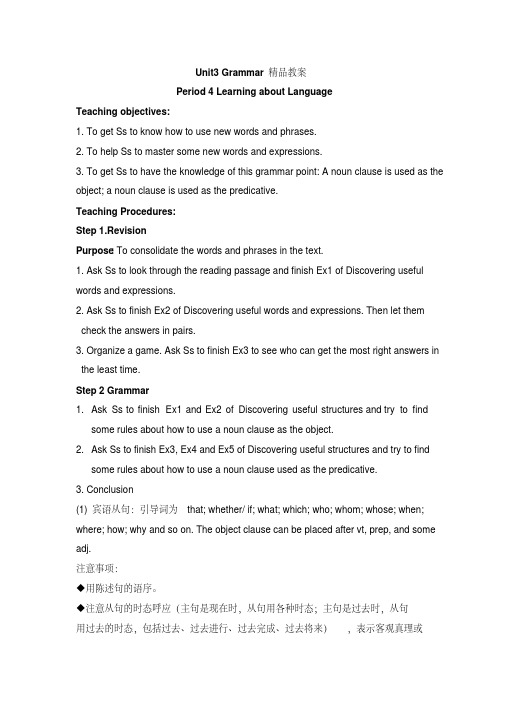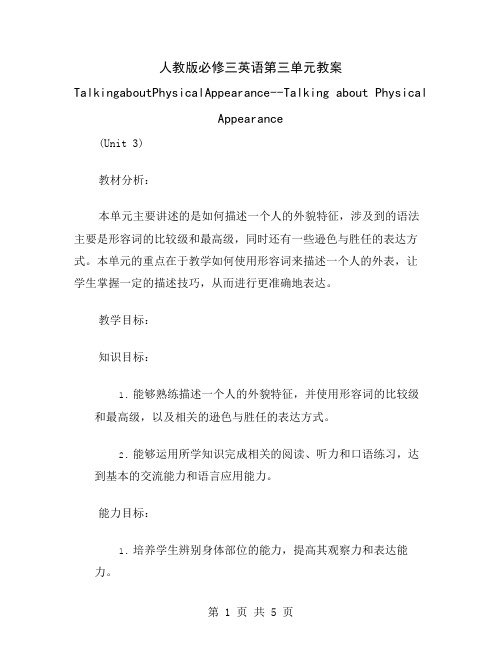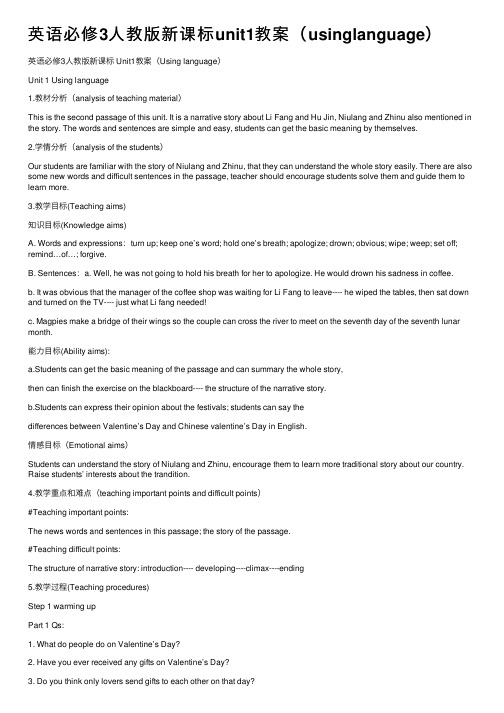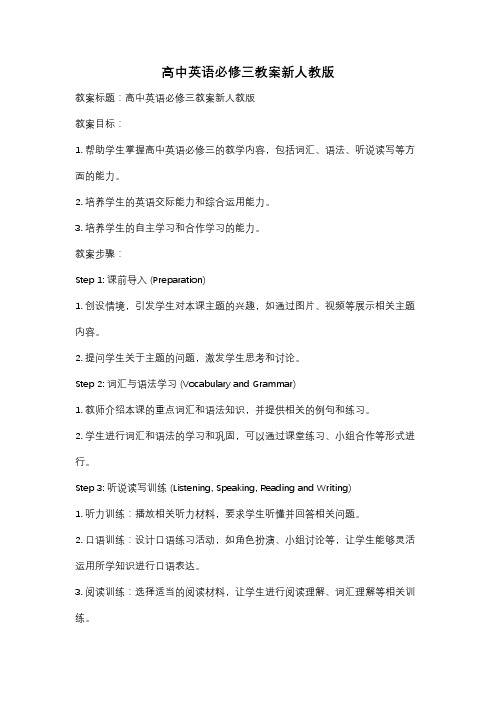人教版英语必修三教案
高中英语新人教版必修三教案

高中英语新人教版必修三教案教案标题:高中英语新人教版必修三教案教学目标:1. 了解和掌握高中英语新人教版必修三的课文内容和语法知识。
2. 提高学生的听说读写能力,培养学生的英语综合运用能力。
3. 培养学生的自主学习和合作学习能力,激发学生的学习兴趣和学习动力。
教学重点:1. 掌握课文的主要内容和重点词汇短语。
2. 理解和运用课文中的语法知识。
3. 提高学生的听说读写能力。
教学难点:1. 理解和运用课文中的难点句型和语法知识。
2. 培养学生的英语综合运用能力。
教学准备:1. 教材:高中英语新人教版必修三教材。
2. 多媒体设备:投影仪、电脑等。
3. 教学辅助材料:教案、课件、练习题等。
教学过程:一、导入(5分钟)1. 创设情境,引入新课。
通过引发学生对课文主题的思考,激发学生的学习兴趣。
2. 通过展示相关图片或视频,引导学生进行讨论和猜测。
二、预习(10分钟)1. 让学生在课前预习课文内容,了解文章大意和重点词汇短语。
2. 学生可以使用课前预习表格或其他方式进行预习。
三、讲解(20分钟)1. 教师对课文内容进行讲解,重点解释生词、短语和句子结构。
2. 教师引导学生理解课文中的难点句型和语法知识,解答学生的疑惑。
四、练习(15分钟)1. 学生进行口语练习,模拟对话或小组讨论,提高学生的口语表达能力。
2. 学生进行听力练习,听取相关录音材料并完成相关练习题。
3. 学生进行阅读理解练习,理解课文内容并回答相关问题。
五、拓展(10分钟)1. 学生进行写作练习,根据课文内容或主题进行写作练习,提高学生的写作能力。
2. 学生进行听力或阅读拓展,听取相关录音材料或阅读相关文章,扩展学生的听说读写能力。
六、总结与反思(5分钟)1. 教师对本课的重点知识进行总结,帮助学生巩固所学内容。
2. 学生进行自我评价和反思,总结学习方法和策略。
教学延伸:1. 学生可以进行小组合作学习,互相讨论和分享学习心得。
2. 学生可以进行课外拓展活动,如参观英语角、听取英语讲座等。
人教版高中英语必修三Unit3Grammar教案全面版

Unit3 Grammar精品教案Period 4 Learning about LanguageTeaching objectives:1. To get Ss to know how to use new words and phrases.2. To help Ss to master some new words and expressions.3. To get Ss to have the knowledge of this grammar point: A noun clause is used as the object; a noun clause is used as the predicative.Teaching Procedures:Step 1.RevisionPurpose: To consolidate the words and phrases in the text.1. Ask Ss to look through the reading passage and finish Ex1 of Discovering useful words and expressions.2. Ask Ss to finish Ex2 of Discovering useful words and expressions. Then let them check the answers in pairs.3. Organize a game. Ask Ss to finish Ex3 to see who can get the most right answers in the least time.Step 2. Grammar1.Ask Ss to finish Ex1 and Ex2 of Discovering useful structures and try to findsome rules about how to use a noun clause as the object.2.Ask Ss to finish Ex3, Ex4 and Ex5 of Discovering useful structures and try to findsome rules about how to use a noun clause used as the predicative.3. Conclusion(1) 宾语从句:引导词为that; whether/ if; what; which; who; whom; whose; when; where; how; why and so on. The object clause can be placed after vt, prep, and some adj.注意事项:◆用陈述句的语序。
人教版必修三英语DescribingPeople课程教案

人教版必修三英语DescribingPeople课程教案人教版必修三英语Describing People课程教案是一份有力的教学工具。
它能够为学生提供关于描述人物的词汇、表达和语法方面的知识,使他们能够更丰富地表达自己的观点,提高他们的英语听说能力,同时也增强了他们的自信和独立思考能力。
本文将讨论这份教案的主要内容,并分析如何利用它来帮助教师和学生有效地学习英语。
Content:人教版必修三英语Describing People课程教案主要包含三个部分。
第一部分是词汇。
这里学生将学会关于人物的各种形容词,如appearance、character、personality、behaviour等等。
通过这一部分教学的学习,学生可以丰富自己的词汇表,并使他们能够更加准确地描述一个人。
第二部分是表达。
学生将学会如何使用形容词和副词来描述人物。
特别是对于行为和个性的表达,课程教案中提供了大量的例句和练习题,帮助学生更好地理解和记忆。
第三部分是语法。
这部分主要介绍了可能涉及到的语法知识点,如定语从句、比较级等。
通过这些语法练习,学生将能够更好地理解和应用语法规则,达到更加流畅地表达自己想法的目的。
接下来,我们来详细地分析这些部分教材如何有效地帮助教师与学生学习英语。
1.词汇部分对于人教版必修三英语Describing People课程教案中的词汇部分而言,教师可以使用图片和视频等多媒体手段来让学生更快地记忆单词。
同时,教师还可以引导学生通过阅读英文文本来建立对单词的意义,使他们更加自然地掌握这些英文单词。
对于学生而言,他们可以通过大量的练习题来巩固这些词汇。
例如,教师可以将实际的图片与具体的描述相对应,让学生阅读并回答相应的问题。
这样,学生可以逐渐形成复杂的词汇条目,并轻松地融入他们的英语语言表达中。
2.表达部分表达部分是人教版必修三英语Describing People课程教案中最重要的部分。
它教给学生如何使用形容词和副词来描述人物的外貌、性格和行为。
人教版必修三英语第三单元教案TalkingaboutPhysicalAppearance

人教版必修三英语第三单元教案TalkingaboutPhysicalAppearance--Talking about PhysicalAppearance(Unit 3)教材分析:本单元主要讲述的是如何描述一个人的外貌特征,涉及到的语法主要是形容词的比较级和最高级,同时还有一些逊色与胜任的表达方式。
本单元的重点在于教学如何使用形容词来描述一个人的外表,让学生掌握一定的描述技巧,从而进行更准确地表达。
教学目标:知识目标:1.能够熟练描述一个人的外貌特征,并使用形容词的比较级和最高级,以及相关的逊色与胜任的表达方式。
2.能够运用所学知识完成相关的阅读、听力和口语练习,达到基本的交流能力和语言应用能力。
能力目标:1.培养学生辨别身体部位的能力,提高其观察力和表达能力。
2.提高学生的英语听、说、读、写的能力,使其能够流利地进行英语口语交流。
情感目标:1.培养学生树立正确的审美观和人生价值观,使其能够尊重不同的文化和不同的人。
2.鼓励学生在语言学习中发扬创新思维,锻炼自我表达的勇气和能力。
教学重点:1.形容词比较级、最高级和逊色与胜任的表达方式的掌握。
2.学生口语表达能力的培养和提高。
教学难点:1.如何正确运用形容词比较级、最高级和逊色与胜任的表达方式。
2.如何培养学生英语口语表达的能力,提高其英语听、说、读、写的能力教学设计:一.课前准备 ( Pre-task preparation)1.教师准备相关的物品,以便于学生在描述一个人的外貌时有具体的东西可以参考。
2.让学生阅读相关的课文,了解相关的语言点和表达方式。
二.引入 (Introduction)1.教师可以通过播放一段视频或者是展示图片,引入对话题的思考。
2.教师可以介绍一些有趣的人物,引入本节课的主要内容。
三.新课教学 (New content)1.形容词的比较级和最高级 (Comparative and superlative adjectives)a.讲解基本的用法和规则。
新人教版必修三Unit 1 Period 1 Listening and Speaking教案

新人教版(2019)英语必修三Unit 1 Period 1 Listening and Thinking教学设计Video: Brazilian CarnivalStep 8 Listen for relationshipsTo listen for a relationship, you need to payattention to how people talk to each other (e.g.friends usually call each other by first names)and some particular questions in theconversation (e.g. “Could I have the bill,please?” tells us that the speaker is a customerin a restaurant). Students listen tothe tips.-Help students learntips in listeningpractice.-Make studentsmaster the listeningskill better.-Better finish thetesting task.Step 9 DiscussionTeacher shows the topic and gives studentsexamples to discuss.In pairs, discuss which of these festivals attractsyou the most and why.EXAMPLE:A: I think the Rio Carnival would be the mostexciting. After all, as you know, love to dance!B: I love dancing, too, but I'm not sure I'denjoy it in such hot weather.A: So which festival do you like best?B: I like ... Use what theyhave learnt fromthe interview tohelp you anddiscuss in groups.-Voice theiropinions.-Practice their teamspirit.-Practice theirthinking skill andimagination.-Practice theirspeaking andlistening.Step 10 PronunciationListen and read aloud the words or phrasesto your partner. Pay attention to the changein the pronunciation of the bold letters.Listen to the following sentences, payingattention to the consonants in bold. How dotheir pronunciations change when they areread in the sentences?1.Did you enjoy the holiday?2.Miss, congratulations on becoming anadult!3.It’ll be too tiring to w alk or dance for along time in those shoes. Students do theexercises.-Improve thestudents’pronunciation skill.4.I was hoping to hear that you had a greattime throughout.5.Children then take part in Easter egg huntsto find the eggs and win prizes.6.In Mexico, the Day of the Dead iscelebrated between October 31st andNovember 2nd.Discuss the differences with your partner. Then listen and repeat.Step 11 AssimilationVideo: AssimilationPronunciation tipsLetters such as "d", "n", "t", and "s" often takeon a different pronunciation from when they areused as initial sounds than when they are used inthe middle of a word or to link words in asentence.For example:• In a word like education, the "du" will become/dʒə/ or /djʊ/, instead of /d(j) ʊ/ as in duty.• An ending "t" followed by a word beginning Learn the relatedknowledge point.-Help studentsunderstand andmaster relatedknowledge points.。
英语必修3人教版新课标unit1教案(usinglanguage)

英语必修3⼈教版新课标unit1教案(usinglanguage)英语必修3⼈教版新课标 Unit1教案(Using language)Unit 1 Using language1.教材分析(analysis of teaching material)This is the second passage of this unit. It is a narrative story about Li Fang and Hu Jin, Niulang and Zhinu also mentioned in the story. The words and sentences are simple and easy, students can get the basic meaning by themselves.2.学情分析(analysis of the students)Our students are familiar with the story of Niulang and Zhinu, that they can understand the whole story easily. There are also some new words and difficult sentences in the passage, teacher should encourage students solve them and guide them to learn more.3.教学⽬标(Teaching aims)知识⽬标(Knowledge aims)A. Words and expressions:turn up; keep one’s word; hold one’s breath; apologize; drown; obvious; wipe; weep; set off; remind…of…; forgive.B. Sentences:a. Well, he was not going to hold his breath for her to apologize. He would drown his sadness in coffee.b. It was obvious that the manager of the coffee shop was waiting for Li Fang to leave---- he wiped the tables, then sat down and turned on the TV---- just what Li fang needed!c. Magpies make a bridge of their wings so the couple can cross the river to meet on the seventh day of the seventh lunar month.能⼒⽬标(Ability aims):a.Students can get the basic meaning of the passage and can summary the whole story,then can finish the exercise on the blackboard---- the structure of the narrative story.b.Students can express their opinion about the festivals; students can say thedifferences between Valentine’s Day and Chinese valentine’s Day in English.情感⽬标(Emotional aims)Students can understand the story of Niulang and Zhinu, encourage them to learn more traditional story about our country. Raise students’ interests about the trandition.4.教学重点和难点(teaching important points and difficult points)#Teaching important points:The news words and sentences in this passage; the story of the passage.#Teaching difficult points:The structure of narrative story: introduction---- developing----climax----ending5.教学过程(Teaching procedures)Step 1 warming upPart 1 Qs:1. What do people do on Valentine’s Day?2. Have you ever received any gifts on Valentine’s Day?3. Do you think only lovers send gifts to each other on that day?Part 2 : Do we have our own Valentine’s Day in China?Qiqiaojie (乞巧节) ---- the seventh day of the seventh lunar monthWell-known poem: Eternal love between us two, Shall withstand the time apart (两情若是久长时,⼜岂在朝朝暮暮。
人教版高中英语必修三全套教案

Module3 Unit 1 Festivals around the worldTeaching aims and demands1.topic: 1>Festivals2> how festivals begin3>how to celebrate festivals2.function: 1>RequestEg: Could you please…?Could I have …? I look forward to doing…2>ThanksEg: It’s a pleasure. /Don’t mention it.It’s very kind of you to…I’d love to …Thank you very much./Thanks a lot.You are most welcome.3.vocabulary:4.grammar:Jin can speak English well. (ability)Could you please show me the way to …? (request)May we see the awards for the team? (permission)She might give you … (possibility)The whole family will come for dinner. (promise)Often he would dress up like a rich man. (pass habit)We would be there with our friends. (promise)II.Key pointsPeriod 1-2 Warming up and fast reading1.Greetings2.Warming upStep 1 discussing the following questionsa.How was your holiday/spring festival?b.Did you go traveling?c.How much pocket money did you get?Step 2 talking1). Name some festivalsSpring Festival Dragon Boat Festival Lantam Festival Mid-Autumn Festival Army Day May Day Teachers’ Day New Year National Day Mother’s Day Children’s Day Father’s D ay Christmas Day Halloween carnival Easter Valentine Day Oben2).Ss work in groups of four and list five Chinese festivals and siscuss when theytake place , what they celevrate and one thing that people do at that time. Festivals Time of year/date Celebrate for Things to do Mid-Autumn DaySpring FestivalDragon Boat DayTomb sweeping DayLantern Festival3.Pre-reading1) What’s your favourite holiday of the year? Why?2) What festivals or celebration do you enjoy in your city or town? Do you likespending festivals with your family or with friends? What part of a festival do you like best—the music, the things to see, the visits or the food?4. Fast reading and find the answers to the following questions.A.What did ancient festivals celebrate?B.What are festivals of the dead for ?C.Why are autumn festivals happy events ? three things people do at spring festival ?Period 3-4 Intensive reading1.Read the passage paragraph and find the main ideas of each paragraphParagraph 1: All kinds of celebration in ancient time.Paragraph 2: The purpose to honour the dead and three examplesFestivals Time Things people doObenDay of the DeadHalloweenParagraph 3: The reasons Why we honour peopleFestivals Who does it celebrate ?Dragon Boat FestivalsClumbus DayIndian National FestivalParagraph 4: Autumn festivals are happy eventsParagraph 5: How people celebrate in spring festivals2.Language pointsa.They would starve if food was difficult to find…starve (v.)饿死;挨饿eg. Millions of people starved to death during the war.Starve for sth 渴望…Eg. The homeless children starve for love.Starvation (n.) 饿死Eg. Die of starvationStarvation wages 不够维持基本生活的工资b.The most ancient festivals would celebrate the end of the cold weather, plantingin spring and harvest in autumn.Celebrate (vt./vi.) 庆祝,赞颂,赞美,举行(仪式)Eg.We celebrate the new year with a party.Their courage was celebrated in all the newspaper.Celebrated (adj.) = famous 著名的,驰名的c. …because they thought these festivals would bring a year of plenty.days/years/…of plenty :富裕(尤指事物和钱)的日子,年月,生活等。
高中英语必修三教案新人教版

高中英语必修三教案新人教版教案标题:高中英语必修三教案新人教版教案目标:1. 帮助学生掌握高中英语必修三的教学内容,包括词汇、语法、听说读写等方面的能力。
2. 培养学生的英语交际能力和综合运用能力。
3. 培养学生的自主学习和合作学习的能力。
教案步骤:Step 1: 课前导入 (Preparation)1. 创设情境,引发学生对本课主题的兴趣,如通过图片、视频等展示相关主题内容。
2. 提问学生关于主题的问题,激发学生思考和讨论。
Step 2: 词汇与语法学习 (Vocabulary and Grammar)1. 教师介绍本课的重点词汇和语法知识,并提供相关的例句和练习。
2. 学生进行词汇和语法的学习和巩固,可以通过课堂练习、小组合作等形式进行。
Step 3: 听说读写训练 (Listening, Speaking, Reading and Writing)1. 听力训练:播放相关听力材料,要求学生听懂并回答相关问题。
2. 口语训练:设计口语练习活动,如角色扮演、小组讨论等,让学生能够灵活运用所学知识进行口语表达。
3. 阅读训练:选择适当的阅读材料,让学生进行阅读理解、词汇理解等相关训练。
4. 写作训练:引导学生进行写作练习,如写作文、写日记等,培养学生的写作能力。
Step 4: 学以致用 (Application)1. 设计相关综合运用活动,如听力填空、阅读理解、写作等,让学生能够将所学知识运用到实际情境中。
2. 引导学生进行合作学习,如小组讨论、合作完成任务等,培养学生的合作能力和团队意识。
Step 5: 总结与评价 (Summary and Evaluation)1. 教师进行本节课的总结,对学生的学习情况进行评价。
2. 学生进行自我评价,反思学习过程中的不足和进步。
Step 6: 课后拓展 (Extension)1. 布置课后作业,巩固所学知识。
2. 提供相关拓展资料,供学生自主学习和探究。
- 1、下载文档前请自行甄别文档内容的完整性,平台不提供额外的编辑、内容补充、找答案等附加服务。
- 2、"仅部分预览"的文档,不可在线预览部分如存在完整性等问题,可反馈申请退款(可完整预览的文档不适用该条件!)。
- 3、如文档侵犯您的权益,请联系客服反馈,我们会尽快为您处理(人工客服工作时间:9:00-18:30)。
人教版英语必修三教案【篇一:人教版英语必修3全套教案】人教版英语必修3 unit1-5 教案unit 1 festivals around the worldteaching aims and demands1.topic: 1festivals2 how festivals begin3how to celebrate festivals2.function: 1requesteg: could you please…?could i have …?i look forward to doing…2thankseg: it?s a pleasure. /don?t mention it.it?s very kind of you to…i?d love to …thank you very much./thanks a lot.you are most welcome.3.vocabulary:4.grammar: 情态动词的用法jin can speak english well. (ability)coul d you please show me the way to …? (request)may we see the awards for the team? (permission)she might give you … (possibility)the whole family will come for dinner. (promise)often he would dress up like a rich man. (pass habit)we would be there with our friends. (promise)ii.key pointsperiod 1 warming up and fast reading1.greetings2.warming upstep 1 discussing the following questionsa.how was your holiday/spring festival?b.did you go traveling?c.how much pocket money did you get?step 2 talking1). name some festivalsspring festival dragon boat festival lantam festival mid-autumn festivalarmy day may day teachers? daynew year national day mother?s daychildren?s day father?s daychristmas day halloween carnivaleaster valentine day oben2).ss work in groups of four and list five chinese festivals and siscuss when they take place , what they celevrate and one thing that people do at that time. then fill in the blanks.festivals time of year/date celebrate for things to domid-autumn dayspring festivaldragon boat daytomb sweeping daylantern festival3.pre-reading1) what?s your favourite holiday of the year? why?2) what festivals or celebration do you enjoy in your city or town? do you like spending festivals with your family or with friends? what part of a festival do you like best—the music, the things to see, the visits or the food?4. fast reading and find the answers to the following questions.a.what did ancient festivals celebrate?b.what are festivals of the dead for ?c.why are autumn festivals happy events ? three things people do at spring festival ?period 2-3 intensive reading1.read the passage paragraph by paragraph and find the main ideas of each paragraphparagraph 1: all kinds of celebration in ancient time.paragraph 2: the purpose to honour the dead and three examplesfestivals time things people doobenday of the deadhalloweenparagraph 3: the reasons why we honour peoplefestivals who does it celebrate ?dragon boat festivalsclumbus dayindian national festivalparagraph 4: autumn festivals are happy eventsparagraph 5: how people celebrate in spring festivals2.language pointsa.they would starve if food was difficult to find…starve 〔v.〕饿死;挨饿eg. millions of people starved to death during the war.starve for sth 渴望?eg. the homeless children starve for love.starvation (n.) 饿死eg. die of starvationstarvation wages 不够维持基本生活的工资b.the most ancient festivals would celebrate the end of the cold weather, planting in spring and harvest in autumn.celebrate (vt./vi.) 庆祝,赞颂,赞美,举行〔仪式〕eg.we celebrate the new year with a party.their courage was celebrated in all the newspaper.celebrated (adj.) = famous 著名的,著名的c. …because they thought these festivals would bring a yearof plenty.days/years/?of plenty :富裕〔尤指事物和钱〕的日子,年月,生活等。
eg.you have a life of plenty, what would you be worried about ?d.some festivals are held to honour the dead, or satisfy and please the ancestors, who could return either to help or to do harm.1〕honour (v.) “尊敬,给?增光” honour sb. (sth.) with sth.〔n.〕“荣誉,荣耀,敬意,面子”win honour for? 为?争光show honour to sb. 尊敬某人in honour of sb.(sth.) = in sb.’s /sth’s honour出于对某人的敬意 eg.there will be a party in honour of his success.为庆祝他的成功将会举行一个晚会。
we have a party in honour of the famous artist.为纪念这位著名艺术家我们举办了这场晚会。
2〕satisfy (vt.)使满意,令人满意eg.that answer won?t satisfy her.那个答案不会使她满意。
satisfied 〔adj.〕满意的〔主语是人〕satisfactory (adj.) 令人满意的〔主语是事而不是人〕satisfying 〔adj.〕令人满意的〔主语是事〕satisfaction 〔n.〕满意eg. she?s satisfied with her son?s progress.对于儿子的进步她感到很满意。
do you think what he said is satisfying?你认为他所见的令人满意吗?3)harm (n.) (u) 伤害eg. don?t be too serious , he meant no harm.(v.) harm sb./sth.=do harm to sb./sth.eg. don?t be afraid, the dog won?t harm you.what you do should do more good than harm.你所做的应该利大于弊。
the dead.in memory of / to the memory of sb. 最为对某人的纪念,纪念某人eg.the museum was built in memory of the famous scientist.f.they dress up and try to frightened people.dress n. 连衣裙/v. dress sb./oneself 给?穿上衣服eg. the first thing she does every morning after getting up is to dress her son.她每天起来第一件事就是帮儿子穿衣服。
